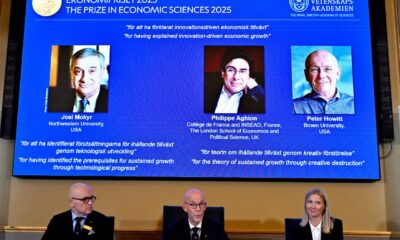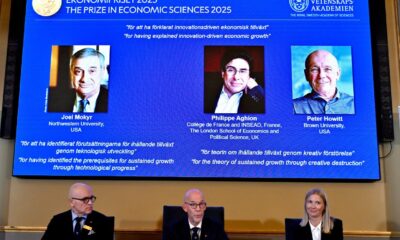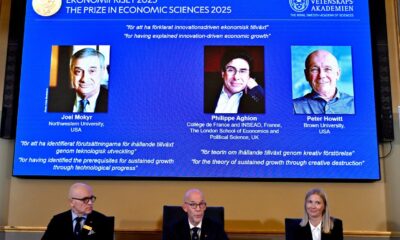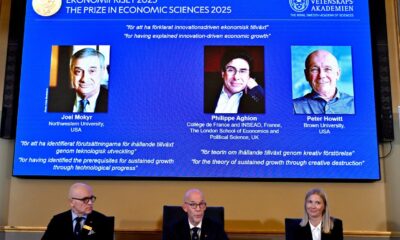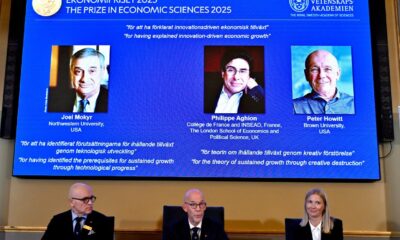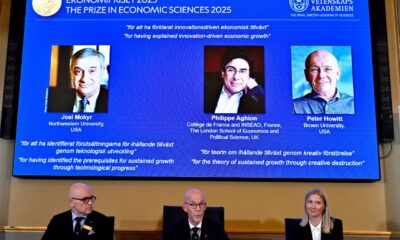Science
Nobel Prize Awarded for Insights into Creative Destruction
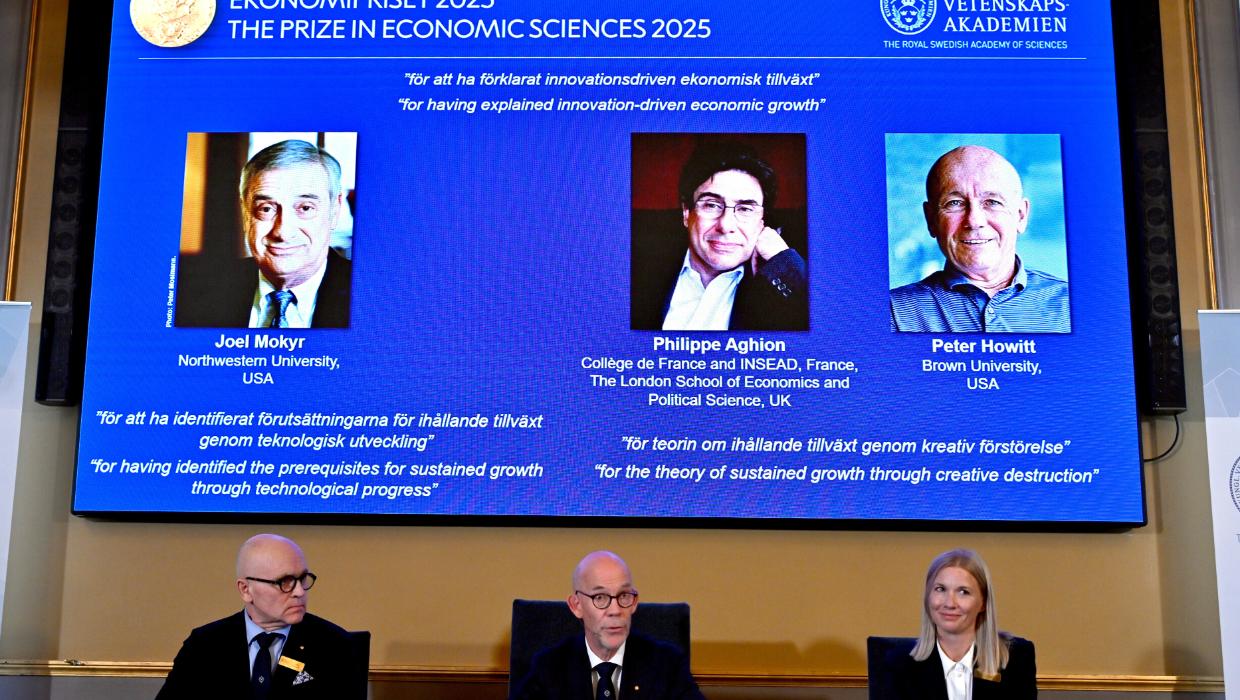
Three researchers were awarded the Nobel Memorial Prize in Economic Sciences on October 9, 2023, for their groundbreaking work on the concept of “creative destruction.” This process illustrates how new innovations and products foster economic growth while often displacing older businesses. The laureates, Joel Mokyr of Northwestern University, Philippe Aghion from the Collège de France and the London School of Economics, and Peter Howitt of Brown University, have made significant contributions to our understanding of the dynamics of innovation.
The Nobel committee recognized their efforts in explaining how technological advancements replace established methods. This concept, closely associated with economist Joseph Schumpeter, has been pivotal in understanding economic evolution. Schumpeter described creative destruction in his 1942 book “Capitalism, Socialism and Democracy,” calling it “the essential fact about capitalism.”
Understanding Creative Destruction
The trio’s research specifically focused on quantifying the mechanisms of creative destruction. Mokyr was noted for demonstrating that for innovations to succeed in a self-reinforcing cycle, it is crucial to have scientific explanations for their effectiveness. Aghion and Howitt contributed to this field with a mathematical model published in 1992, which provided new insights into how sustained economic growth can be achieved through innovation.
Real-world examples of creative destruction abound, including the rise of e-commerce, which has significantly impacted traditional retail, and streaming services that have replaced physical media rentals. Historical illustrations include the decline of horse-cart whip makers due to the advent of the automobile, highlighting how innovation can reshape industries.
John Hassler, chair of the committee for the prize in economic sciences, emphasized that the laureates’ work illustrates that economic growth is not guaranteed. He urged the need to support the mechanisms behind creative destruction to avoid stagnation, suggesting that markets dominated by a few large companies can stifle innovation. This concern is particularly relevant in sectors like telecommunications and social media.
The Future of Innovation and Artificial Intelligence
Aghion stressed the importance of aiding those affected by technological shifts and promoting social mobility. He pointed out that individuals should not be defined by their parents’ professions, advocating for a system that encourages movement to more productive workplaces.
Mokyr, known for his optimistic outlook on technological progress, reflected on the skepticism some economists have regarding the impact of modern innovations. He argued that while new technologies such as smartphones may not show immediate economic benefits in traditional metrics, they offer substantial societal advantages. In a 2015 interview, he cited the music streaming platform Spotify as an example of an innovation that provided significant value despite being difficult to quantify economically.
The current discourse includes the potential of artificial intelligence (AI). Aghion noted that AI presents enormous growth possibilities, dependent on the policies and institutions established to support competition in the sector. Mokyr dismissed concerns that AI would lead to job losses, suggesting instead that it could facilitate more engaging and challenging work for individuals.
The Nobel Prize, worth 11 million Swedish kronor (approximately $2.02 million), is divided among the winners, with Mokyr receiving half while Aghion and Howitt share the remainder. Each laureate also receives an 18-carat gold medal and a diploma. The prize, formally known as the Bank of Sweden Prize in Economic Sciences in Memory of Alfred Nobel, has been awarded since 1968 and is presented alongside the other Nobel Prizes on December 10, the anniversary of Nobel’s death in 1896.
As the announcement of the Nobel honors unfolded, Mokyr expressed surprise at receiving the prestigious award, recounting how he learned of his win early in the morning. Howitt and Aghion similarly shared their astonishment, reflecting on the significance of winning alongside esteemed colleagues.
The work of these economists underscores the critical role of innovation in driving economic growth and improving human welfare, reinforcing the need for concerted efforts to foster an environment conducive to creative destruction.
-

 World6 days ago
World6 days agoPrivate Funeral Held for Dean Field and His Three Children
-

 Top Stories1 week ago
Top Stories1 week agoFuneral Planned for Field Siblings After Tragic House Fire
-

 Sports3 months ago
Sports3 months agoNetball New Zealand Stands Down Dame Noeline Taurua for Series
-

 Entertainment3 months ago
Entertainment3 months agoTributes Pour In for Lachlan Rofe, Reality Star, Dead at 47
-

 Entertainment2 months ago
Entertainment2 months agoNew ‘Maverick’ Chaser Joins Beat the Chasers Season Finale
-

 Sports3 months ago
Sports3 months agoSilver Ferns Legend Laura Langman Criticizes Team’s Attitude
-

 Sports4 weeks ago
Sports4 weeks agoEli Katoa Rushed to Hospital After Sideline Incident During Match
-

 Politics2 months ago
Politics2 months agoNetball NZ Calls for Respect Amid Dame Taurua’s Standoff
-

 World2 weeks ago
World2 weeks agoInvestigation Underway in Tragic Sanson House Fire Involving Family
-

 Entertainment3 months ago
Entertainment3 months agoKhloe Kardashian Embraces Innovative Stem Cell Therapy in Mexico
-

 Sports4 weeks ago
Sports4 weeks agoJamie Melham Triumphs Over Husband Ben in Melbourne Cup Victory
-

 World4 months ago
World4 months agoPolice Arrest Multiple Individuals During Funeral for Zain Taikato-Fox

